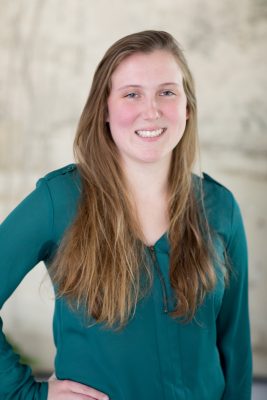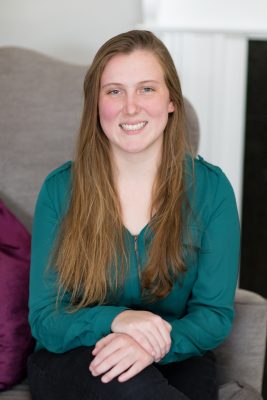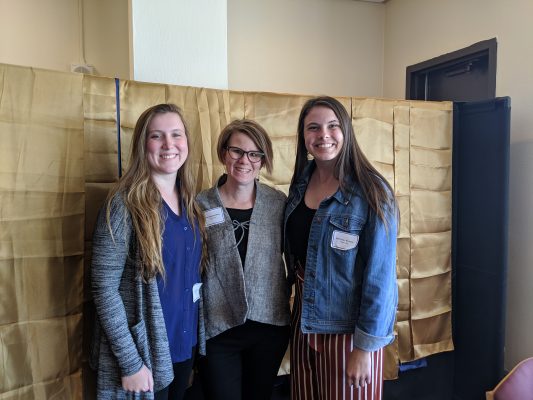Krull ՚20 personalized her degree to fit her interests
 Hometown: Winfield, Illinois
Hometown: Winfield, Illinois
Degree: B.A. in sociology with minors in psychology and statistics
After her Sociology 101 course, Allison Krull ՚20 realized taking a sociology class was a fascinating way to learn how to talk about everyday things in a more analytical way.
“I’m really grateful to the Sociology Department for continuously pushing me to think more deeply and consider the perspectives of others to shape my own worldview,” Krull says. “That’s why I chose sociology as my major. As a minor, I chose psychology as a complementary field of study so that I could analyze people both from an individual level and a societal one.”
Professor of Psychology and Behavioral Neuroscience Steven Neese acted as Krull’s advisor for her psychology minor and taught her in class.
“Allison was a dedicated student that showed a true appreciation for the intersection of psychology with all aspects of her Cornell education,” Neese says. “Specifically, she showed an ability to understand how individual cognitive processes could influence the behaviors of those in a larger group, paralleling the actions of individuals to larger groups. Allison was an excellent student and contributed greatly to class discussion and group projects.”
Krull chose a second minor in statistics because she loved the process of writing a stats paper. She felt the process enabled her to apply the statistical techniques she had learned to real-world issues that could be analyzed through a psychological or sociological lens.
 “This path of study has allowed me to incorporate my numerous interests in a useful way that will serve me well in my future,” Krull says.
“This path of study has allowed me to incorporate my numerous interests in a useful way that will serve me well in my future,” Krull says.
Krull worked with a community partner during the summer of 2019 through the Cornell Summer Research Institute, where she completed a data-focused project for the Willis Dady Homeless Services in Cedar Rapids, Iowa. Krull cleaned up the data and analyzed it to help the shelter and its community partners gain a better understanding of the population they sought to assist in acquiring emergency winter shelter.
The community partners of this research hoped that this project would aid them to understand the extent of chronic homelessness locally, identify ways to meet the needs of the homeless, and assess, evaluate, improve, and standardize the intake and data collection process.
Krull presented her findings in community meetings, meetings with the city-wide collaborators, and to her peers at Cornell.
“This was an invaluable opportunity for me because it gave me a taste of data-driven research in a sociological context, and now I know that type of work is something I would love to do as a career,” Krull says.

Her most important academic achievement, according to Krull, was a secondary data analysis research project she completed during her Sociological Research Methods course. She says she wrote the longest paper she’s ever written. Krull won an award at the 2019 Iowa Sociological Conference for that paper, “Problem-Solving Courts: An Examination of Program Components and Graduation Outcomes.”
Ringer Distinguished Professor of Sociology Tori Barnes-Brus says Krull’s dedication to the research project was impressive and that Krull handled the challenges of research with calm and determination, never wavering in her commitment to the project when other students might have shifted gears.
Barnes-Brus says Cornell’s Research Methods course demonstrates what students can accomplish in a block.
“It’s really exciting for them to put their hearts and souls into Cornell’s Research Methods course and to be able to come out of that and see why what we do in 18 days of our One Course At A Time curriculum works,” Barnes-Brus says.
Cornell College students spend 3 ½ weeks each block completely immersed in their one course of study and mentored by a professor whose sole focus is on the same one course for the duration of the block. Coursework mimics the real-word.
“One Course at a Time was an ideal fit for me,” Krull says as she reflects on her entire Cornell experience. “I learned strategies to avoid procrastination and found a class format that allowed me to maximize the contact with professors that I knew I wanted while diving into subject material in such an immersive way.”
During Krull’s sophomore year, she went with an Alternative Spring Break group to a Native American reservation in South Dakota, where they helped build shelters for people experiencing homelessness on the reservation. This was her first truly immersive off-campus experience and she says it shaped how she embraces every chance she gets to interact with people from cultures other than her own.
The block plan allows for greater flexibility in how students learn. For Krull, it enabled her to travel for two different off-campus studies courses. She went to Europe for a Psychology of the Holocaust course and to Nepal for an Anthropology of Health and Well-being course. She says both classes were made infinitely more impactful and informative by being offered abroad.
Cornell professors can teach block-long courses anywhere that the subject matter dictates thanks to the block plan’s flexibility. When a professor only teaches One Course At Time and students only take one course, the location of the “classroom” can become a core component of the educational experience.
“These classes broadened my worldview by exposing me to other cultures and helped cement my desire to live abroad in the future,” Krull says. “I absolutely loved every minute of traveling with these classes, completing readings, and then seeing the places in the readings in person.”
Krull sees her biggest challenge at Cornell was pushing herself out of her comfort zone, which she says, was staying in her residence hall room watching Netflix. She definitely succeeded in her efforts to experience a holistic college experience.
She mentored elementary students through the Civic Engagement’s program, Lunch Buddies, and she was the student manager for the women’s basketball team, all four years. She also managed the volleyball team during her junior and senior years. Krull participated in the Berry Career Institute’s LEADS program, where she says she honed her professional interpersonal skills and she networked with professionals and explored various career paths during a Chicago career tour sponsored by the Institute.
And as if that were not enough to keep anyone busy, Krull worked as a consultant in both the Writing Studio and the Quantitative Reasoning Studio in the library.
“I am eternally grateful for the experience of working at both studios,” Krull says. “My bosses [Writing Studio Director Laura Farmer and Quantitative Reasoning Studio Director Jessica Johanningmeier] are also amazing women and have taught me so much through formal training but also just by being around them.”
Krull hopes that she helped Cornell students feel more comfortable while working with words and numbers.
Next up for Krull is a gap year before attending graduate school to study criminal justice. Barnes-Brus sees a bright star in Krull and an equally bright future.
“Allison is truly an exemplar of the liberal arts. She continuously seeks opportunities for academic and personal growth. Allison enthusiastically accepts—even welcomes—challenges of such great variety, from hiking the Himalayas to conducting secondary data analysis in research methods, to assisting a local homeless shelter to analyze data about their services, and in doing so, she always finds ways to support and help others who are on the journey with her,” says Barnes-Brus. “Allison’s humor, dedication, and her compassionate persona have positioned her as a quiet leader within the Sociology and Anthropology department. Her ability to balance multiple jobs on campus while also maintaining impressive academic work demonstrates both Allison’s strong work ethic and her commitment to Cornell College. I am inspired by Allison’s deep, critical thinking about her course work and the world around her. She is among the most reflective, compassionate, and engaged students I have worked with at Cornell.”
Allison’s Hilltop Faves
Favorite food Cereal is definitely my favorite food at the Hilltop, but I also love grilled cheese Mondays! At Zamora’s, I get a breakfast sandwich on a bagel every time.
What she’ll miss the most My friends, professors, and bosses; and getting to see everyone every day to check-in and chat.
Tags: Berry Career Institute, civic engagement, mathematics, off-campus studies, psychology, research, senior-profile, sociology & anthropology



